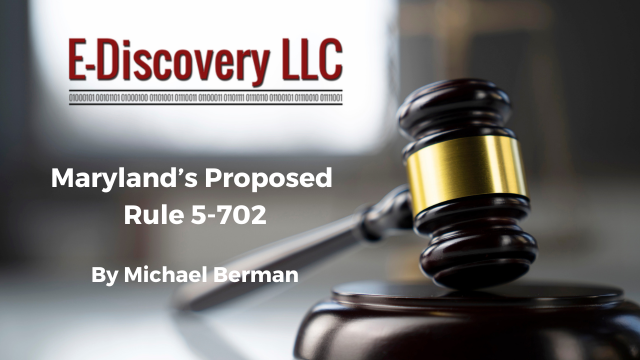
[EDRM Editor’s Note: The opinions and positions are those of Michael Berman.]
Maryland’s Standing Committee on Rules of Practice and Procedure (“Rules Committee”) has published an agenda that includes consideration of amendments to Maryland Rule 5-702 (testimony by experts).
Two recent developments are the genesis of the proposal. “First, the Federal Rules Committee has recently made changes to Rule 702, the federal equivalent to Rule 5-702…. Second, the Supreme Court of Maryland recently clarified and discussed Rule 5-702, Federal Rule 702, and how they fit into the post-Rochkind [v. Stevenson, 471 Md. 1 (2020)] landscape.” Id.
Maryland’s Standing Committee on Rules of Practice and Procedure (“Rules Committee”) has published an agenda that includes consideration of amendments to Maryland Rule 5-702 (testimony by experts).
Michael Berman.
According to the Deputy Reporter, the proposal is intended “to bring [Maryland] Rule 5-702 into closer alignment with the recent amendments to Federal Rule 702” and Maryland decisional law, citing Katz, Abosch, Windesheim, Gershman & Freedman, P.A., et al., v. Parkway Neuroscience and Spine Institute, LLC, ___ Md. _____ (No. 30, September Term, 2022, August 30, 2023). The preponderance of the evidence standard is adopted and several sub-factors are added.
The proposed rule (new language is underlined) is:
RULE 5-702. TESTIMONY BY EXPERTS
Expert testimony may be admitted, in the form of an opinion or otherwise, if the court determines that the testimony will assist the trier of fact to understand the evidence or to determine a fact in issue. In making that determination, the court shall determine by a preponderance of the evidence:
(1) whether the witness is qualified as an expert by knowledge, skill, experience, training, or education,
(2) the appropriateness of the expert testimony on the particular subject, and (3) whether a sufficient factual basis exists to support the expert testimony
.based on whether the expert’s opinion:(A) has an adequate supply of facts or data; and
(B) reflects a reliable application of reliable principles and methods to the facts of the case.
Maryland Rule 5-702. Testimony by Experts.
Fed.R.Evid. 702 differs. As proposed and absent Congressional action, it states:
A witness who is qualified as an expert by knowledge, skill, experience, training, or education may testify in the form of an opinion or otherwise if:
<[Text of initial paragraph effective December 1, 2023, absent contrary Congressional action.] >
A witness who is qualified as an expert by knowledge, skill, experience, training, or education may testify in the form of an opinion or otherwise if the proponent demonstrates to the court that it is more likely than not that:
(a) the expert’s scientific, technical, or other specialized knowledge will help the trier of fact to understand the evidence or to determine a fact in issue;
(b) the testimony is based on sufficient facts or data;
(c) the testimony is the product of reliable principles and methods; and
<[Text of subsection (d) effective until December 1, 2023, absent contrary Congressional action.] >
(d) the expert has reliably applied the principles and methods to the facts of the case.
<[Text of subsection (d) effective December 1, 2023, absent contrary Congressional action.] >
(d) the expert’s opinion reflects a reliable application of the principles and methods to the facts of the case.
Fed.R.Evid. 702.
Sometimes Maryland Rules track the federal rules, and other times they do not:
Maryland v. Federal Clawback and Privilege Non-Waiver Rules – E-Discovery LLC (ediscoveryllc.com)
Maryland v. Federal Summary Judgment Rule – E-Discovery LLC (ediscoveryllc.com)
Does Maryland Have an Analog to Fed.R.Civ.P. 26(g)? – E-Discovery LLC (ediscoveryllc.com)
Some of the differences can be explained by the differing federal and State caseloads. Recently, for example, the Maryland Rules Committee proposed a 30-request limit to requests for production of documents. It did so after a practitioner reported receiving over 150 requests from one party in a single case.
The Supreme Court of Maryland rejected the proposal. The discussion was fascinating.
The decision was to return the proposal to the Rules Committee with specific guidance. The proposed rule is posted at 219threport.pdf (mdcourts.gov).
Michael Berman.
The Court’s open hearing is posted at courts.state.md.us/sites/default/files/import/coappeals/media/2023openmtgs/20231102openmeeting218th219th.mp4.
It will be interesting to follow proposed Rule 5-702.
One question was should there be any “cap” in light of the other available tools such as protective orders and scheduling orders. The other question was, if there is a cap, is 30 the “sweet spot?”
The Family Law Section Council of the Maryland State Bar Association stated that 30 document requests are too few for family law cases, and provided concrete examples. The Council also suggested that “form” or pattern requests would be helpful.
There were also suggestions by others that Maryland should look at initial disclosures, such as those in the Federal Rules of Civil Procedure. And, there were suggestions that a cap could be circumvented using subpoenas.
The decision was to return the proposal to the Rules Committee with specific guidance. The proposed rule is posted at 219threport.pdf (mdcourts.gov). The Court’s open hearing is posted at courts.state.md.us/sites/default/files/import/coappeals/media/2023openmtgs/20231102openmeeting218th219th.mp4.
It will be interesting to follow proposed Rule 5-702.


